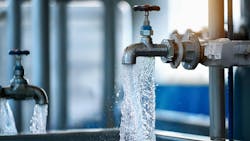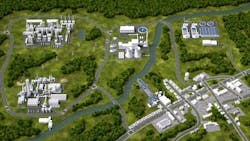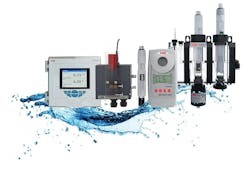Why does chlorine play such an important role in the treatment of the world’s drinking water systems?
Chlorine plays a key role in ensuring the safety of our potable water supply. As a vital part of the water treatment process, it kills or inactivates bacteria, viruses and other microorganisms that pose a risk to public health.
Chlorine’s use as a disinfectant has steadily increased since the early 1900s. And today it’s used all over the world to ensure the safety and palatability of drinking water supplies. Chlorination’s role in ensuring water quality has made it a key part of many water utilities’ strategy. And indeed, its use in public water systems is mandated by many governments worldwide.
What are the benefits of using chlorine in decontamination of our drinking water supply?
The advantages of using chlorine for the decontamination of our water supply – either on its own or in conjunction with other chemicals like ammonia – are numerous. Relatively economical and widely available, chlorine also plays a valuable secondary role, with residual amounts remaining after the initial treatment process ensuring that water stays protected in the wider distribution system. Other incremental benefits in the distribution system include the removal of iron and manganese that can cause staining; limiting the growth of algae in water filtration systems; and removing hydrogen sulfide, the pungent smelling ‘rotten egg’ gas that in solution can stain and discolour consumers’ plumbing fixtures, laundry and silverware.
What are the uses of chlorine in wastewater treatment?
Aside from its role in disinfecting drinking water, chlorine also has several uses and benefits in the treatment of wastewater, where it is used to control odor and septicity.
Chlorine dosage can be used to reduce biological oxygen demand (BOD), a measure of oxygen demand from biological organisms present in a water sample. In wastewater treatment plants, high levels of BOD require higher aeration levels which increase operational costs. With the addition of chlorine, addition of chlorine leads to a reduction of BOD.
The presence of ammonia (NH3) in wastewater can deplete dissolved oxygen and stimulate algae growth, causing harm to aquatic life. Here chlorination can be used to control ammonia levels in wastewater.
Adding chlorine also acts as an emulsifier, helping with the break-up and removal of oils and grease that can cause problems in wastewater treatment plants such as blocking of filters.
What are the dangers of the presence of excess chlorine in our water supply?
Maintaining an optimal residual chlorine level after water exits the treatment plant helps ensure that water distributed to consumers is safe and palatable to drink.
Balancing the benefits of chlorine as a highly effective and readily available disinfectant, however, care must be taken to ensure levels of this toxic gas are carefully controlled when it’s used to treat drinking water for consumption.
Limiting chlorine levels in wastewater discharged into the environment is vital to avoiding harm to aquatic animals and plants. Maximum safe chlorine limits in the distribution system are accordingly defined in World Health Organization (WHO) recommendations.
What are the dangers around the handling of chlorine?
There are strict health and safety regulations surrounding the distribution of chlorine gas. As a highly toxic chemical, it can be fatal after only a few breaths at concentrations of only 0.1% in air. Chlorine is 2.5 times heavier than air, so will remain close to the ground where it could easily be inhaled. It’s also hazardous when combined with moisture (including body moisture) where it becomes highly acidic and corrosive.
What is the importance of accurate chlorine flow rate measurement in water disinfection applications?
Precise measurement of flow rates during dosing of elemental chlorine (Cl2) in either liquid or gas form is essential to achieve effective disinfection without over-chlorination. In this application flowmeters can be used to support highly accurate and consistent real-time monitoring and control of chlorine dosage. This is achieved by comparing flow rate with the amount of chlorine injected into the system, ensuring regulatory compliance and avoiding risks to human health. Ensuring correct dosage also makes more efficient use of chemicals and helps to reduce operational costs.
What solutions are offered for accurate chlorine measurement and control in water disinfection applications?
ABB’s ChloroStar family of sensors, transmitters, and accessories makes it easier than ever to accurately control safe, effective chlorine levels. The range offers a choice of chlorine measurement solutions to suit a wide range of drinking water treatment and other industrial needs. System installation and operation is refreshingly easy, supported by features including easy setup technology, self-cleaning sensors, modular installation, and wireless access via a mobile device.
One option is a three-electrode membrane-covered sensor that allows highly accurate, reliable measurement of free or total chlorine without the need for any additional sample buffering. Its bufferless design makes the sensor suitable for operation over a wide pH range including elevated pH applications. Using the sensor enables sample waste to be reduced to just one litre per hour (0.26 US gall per hour).
Another option within the family simplifies free and total chlorine level measurement in foul-prone applications. Its self-cleaning open-cell flow-through design uses a sand vortex to maintain cleanliness of the electrodes, minimizing maintenance requirements and reducing the danger of blocking or clogging that commonly affects other types of sensors. This provides an ideal solution for high-fouling applications like wastewater that demand accurate measurement of chlorine or chlorine dioxide under stable pH conditions.
About the Author
Julian Edwards
Julian Edwards is analytical sales specialist for ABB Measurement Products.


